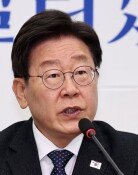S. Korea-U.S. relationship is at stake at the Moon-Trump summit
S. Korea-U.S. relationship is at stake at the Moon-Trump summit
Posted June. 27, 2017 07:21,
Updated June. 27, 2017 07:37
President Moon Jae-in is leaving Korea on Wednesday for a summit with U.S. President Donald Trump. Following a dinner with Mr. Trump on Thursday local time, President Moon will have a summit, an enlarged summit and a joint press conference on Friday. President Trump who was inaugurated in January has had 32 summits in Washington with Chinese President Xi Jinping, Japanese Prime Minister Shinzo Abe, Russian President Vladimir Putin and other European leaders. For President Moon, it is the first summit with a major country’s leader and also a debut on the global stage in less than two months since his inauguration.
It is a “belated summit” given the history of the Korea-U.S. relationship and the gravity of the Korea-U.S. alliance in Korea’s security. Although it is due to domestic politics involving former President Park Geun-hye and the early presidential election, it is regrettable that we only start now whereas the leaders of other countries headed for Washington for their country’s interests as soon as a new president of the superpower was elected. As such, President Moon has a heavy responsibility to carry out.
President Moon invited seven former ambassadors to the U.S., including Lee Hong-gu, Han Deok-soo, and Han Seung-joo, to the presidential office on Monday to prepare for the upcoming summit. The situation is challenging, however. Many are concerned and also have some hopes about the outcome of the odd combination between the hard-to-predict president with a business background and a liberal human rights lawyer-turned-president. The two leaders have shown disagreement over North Korea’s nuclear issues and the deployment of THAAD and economic cooperation issues including renegotiations over the Korea-U.S. free trade agreement.
Both sides have a different view on the preconditions for the resumption of talks with the North. While Washington wants no further provocation in nuclear weapons and missile launches, Korea considers progress towards denuclearization. Washington says it cannot understand why the deployment of four missile launchers in addition to the two launchers that had been deployed in Seongju was suspended for an environmental impact assessment. However, negotiations are to narrow the differences and summits are particularly for a political solution to problems that cannot be addressed at a working level. Considering the relatively amicable U.S.-China summit, over which many had concerns, President Moon might refer to President Xi’s case.
In retrospect, the Korea-U.S. relations under the U.S. Republican administration and the Korean liberal administration – namely the Kim Dae-jung and Roh Moo-hyun administrations – could not be worse than ever. The Moon Jae-in administration should not repeat the same mistakes of the former liberal administrations by taking rash actions choosing China over the U.S. People have been encircling the U.S. Embassy to Seoul as a sign of protests against THAAD. President Moon should hopefully take this opportunity to stress that he, the son of refugees who the U.S. saved, has become a Korean president and some anti-U.S. voices are not the mainstream of Koreans to reassure President Trump and the U.S. leadership. And hopefully, President Moon can become the spearhead in safeguarding the country’s national interests during his visit to the U.S.







